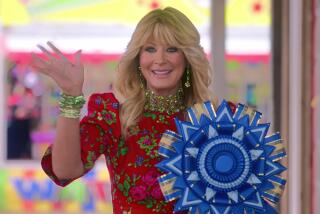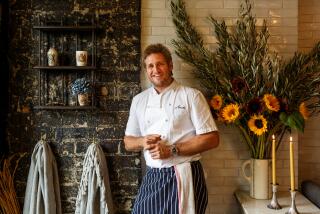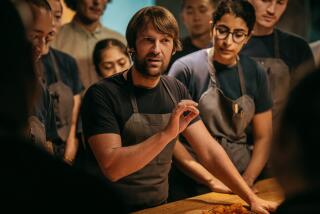Gordon Ramsay will be cooking — and boiling over — this summer
It’s going to be a “hell” of a summer.
Chef Gordon Ramsay has one, two, three prime-time shows on Fox this season.”MasterChef” and “Hell’s Kitchen” will dominate the network’s prime-time programming on Mondays and Tuesday. A third show — “Hotel Hell,” which features the famously furious chef darkening the doorway of hotels, inns and bed-and-breakfasts in need of a makeover — will be unveiled later in the summer.
It all raises the question, though: Can you have too much Gordon Ramsay? Or, for that matter, too many cooking competitions and makeover shows?
“So far, it’s working,” Ramsay quipped last week. “Is it overexposure? Is it too much? You have to ask the audience that, darling.”
Viewers seem to agree with him: “Hell’s Kitchen” and “MasterChef” returned strong for their season premieres Monday night. “Hell’s Kitchen” brought in 5.4 million viewers, while “MasterChef” had just more than 5 million.
Ramsay said he believes the two shows are “completely different programs” with unique twists — enough to keep audiences coming back. Those very same viewers might suffer whiplash shifting from “Hell’s Kitchen” to “MasterChef,” and Ramsay’s transformation between the two.
Think Dr. Jekyll and Mr. Hyde.
“Hell’s Kitchen” is a bare-knuckled, culinary boot camp in which experienced chefs from across the country walk in off the street and into a pop-up kitchen and begin cooking for their lives. Men are pitted against women in a bid to land a spot in a top-tier kitchen and $250,000 salary. In this season, the show’s 10th, the winner of this televised job tryout joins the staff at Gordon Ramsay Steak, his new restaurant at Paris Las Vegas.
Along the way, Ramsay won’t hesitate to curse out competitors who botch the scallops, fail to properly cook a beef Wellington or, God forbid, serve raw chicken.
“I get upset because my job is to stop it,” Ramsay said, who said the possibility of a customer becoming ill because of something that came out of the kitchen hurts the entire restaurant industry. “We’re talking about serious, serious ramifications.... They don’t understand the backlash, what it can do to a restaurant, to your reputation serving something raw.”
Compare that to the version of Ramsay that shows up to the heart-tugging amateur-cooking competition “MasterChef.”
On that show, Ramsay shares center stage with fellow judges chef Graham Elliot and restaurateur Joe Bastianich and doesn’t try to outshine them. In this arena, Ramsay said, he relishes the role of playing the inspiring, sympathetic mentor. (The Simon Cowell-esque role goes to Bastianich and his withering glare.)
Now in its third season, “MasterChef” probably says as much about our nation’s values and educational system as it does cooking: Many of the competitors are people who pursued careers that didn’t really suit them. Now, they find themselves hankering for a career change that will allow them to do something they love instead of just paying the bills.
Among the competitors this season: An opera singer, a plastic surgeon, a stockbroker — and, believe it or not, a blind woman, Christine Ha, who lost her sight as an adult and now cooks largely from memory. Ramsay said she “cooked like an angel” but ended up inspiring the judges most of all with her sheer grit.
At one point, Ha was last to be chosen as the competitors divided into teams, Ramsay said. (Apparently, no one wants a blind teammate.) “I was pretty impressed, not just with her finesse but the way she handled the downsides. She managed to keep her neck above the water,” Ramsay said.
Some pop culture experts believe Ramsay should enjoy this while it lasts.
“I think we have reached a plateau. Many of the competitive cooking shows appear to be unimaginative, uninteresting and frankly tiring,” said Krishnendu Ray, a New York University professor who explores the intersection of food, ethnicity and pop culture. “I do not think we can develop any more enthusiasm for another cooking-as-sports show.”
By contrast, Food Network’s Alton Brown, who hosts many of the channel’s cooking competitions including “Food Network Star” and “Iron Chef America,” said he believes the entertainment industry has only just begun to dig into the world of food-as-entertainment. (Exhibit A? How about Anthony Bourdain’s joining CNN.
Brown predicts more shows on more channels, and says the nation’s appetite is insatiable. Food competitions, in particular, will continue to be explored in new and unexpected ways, he said.
“We’re still really in a nascent stage, we’re really only limited by our imagination,” he said. “Food is one of the last universal connective tissues we have as a society. It’s more universal than sports.”
After all, everyone has to eat. Watching that baseball game? It’s actually optional.
Ramsay isn’t concerned about doom-and-gloom predictions. He said the shows will remain viable as long as there is something for audiences to learn from them.
And if there’s one lesson to impart, it’s this: Don’t be such know-it-all (which is, of course, impossible). Go forth and be vulnerable.
“You know when you are in a vulnerable situation … and you are not in charge? You will be surprised at what you learn,” Ramsay said. “Becoming vulnerable makes that mind work 10 times quicker when you want to learn something. I like going into situations, still today, of not knowing that particular ingredient, that particular dish or that particular culture 100%. I love the discovery. That’s the exciting thing about food I think, the discovery.”
More to Read
The complete guide to home viewing
Get Screen Gab for everything about the TV shows and streaming movies everyone’s talking about.
You may occasionally receive promotional content from the Los Angeles Times.







